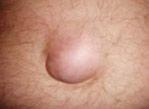What is Hernia?

A hernia is a bulge of an internal organ through weakness or abnormal opening in the wall of the cavity in which it normally resides (generally the intestines from the abdomen comes out through the defect in the muscles). A hernia usually presents as painless lump in the groin (the area where leg and abdomen meet) which disappears on lying down.
Most hernias are detected by a surgeon during a physical examination.
Once a hernia has developed it will tend to enlarge and cause discomfort. If a loop of bowel gets caught in the hernia it may become obstructed or its blood supply may be cut off (strangulated). This could then become a life-threatening situation. Most surgeons therefore recommend that hernias be repaired when diagnosed.Longer time of rest (average 6 weeks) after surgery and the chance of the hernia coming back (a recurrent hernia) are some of the limitation of open Hernia surgery which led to rapid popularity of Laparoscopic Hernia Surgery all over the world and in India. Laparoscopic Hernia repair using small incisions offers rapid recovery, less pain and quick return to work.
Causes & Contributing Risk Factors for Hernia
What are the Symptoms of Hernia?

The most common symptom of a hernia is a painless lump in the groin or in males a bulge in the scrotum.
This may present with straining while lifting heavy objects, during a bowel movement, coughing or sneezing.
The lump may disappear on lying down or even with gentle pressure. A small hernia may not even be noticed and may only be detected during a routine examination.
Severe continuous pain, redness, and tenderness are signs that a hernia may be entrapped or strangulated.
A hernia is dangerous if it gets trapped in the weak spot in the abdominal wall (obstructed Hernia) and blood supply cut off (strangulated Hernia). A strangulated hernia is an emergency requiring surgery.
How to Diagnose Hernia?
A hernia is usually diagnosed by a surgeon through a simple physical examination. He can feel a hernia by placing a finger in the groin and asking the patient to a cough (impulse on coughing).
A hernia that bulges out with abdominal pressure but returns inside the body when the pressure is gone or with gentle pressure from the outside is a reducible hernia.
A Hernia that remains outside is “irreducible” or incarcerated hernia.
If bulging tissue loses blood flow it is the strangulated hernia.
Our Specialist

Dr. Nitish Jhawar
M.S., FMAS, FIAGES, FALS, FACRSI
Fellow Advance Laparoscopic Surgery
Fellow Colorectal Surgery USA
Senior Laparoscopic & Colorectal Surgeon
Phone No: +91 9322 229 159
Email Id: info@neoalta.com

